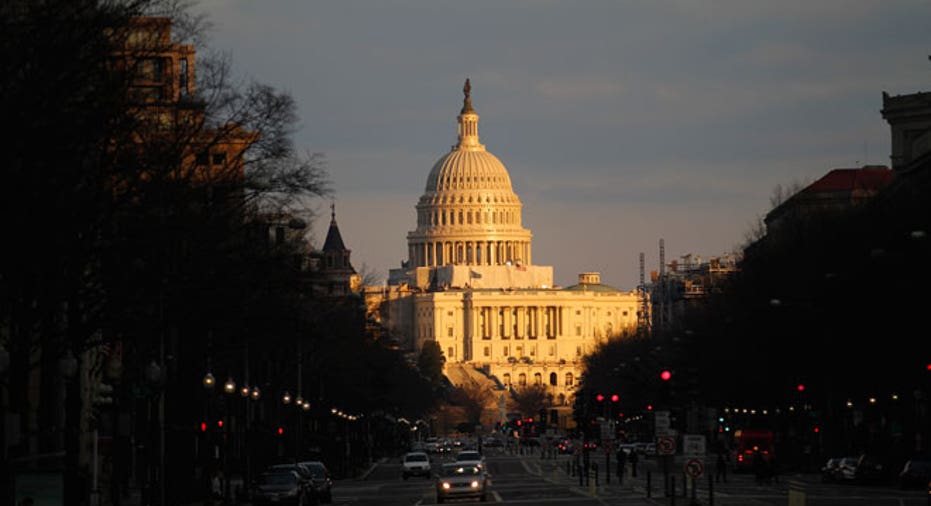The Bullish Case on the Looming Fiscal Cliff

If the U.S. falls off the fiscal cliff at the end of the year, forecasters warn the economy will likely plunge into a recession and the stock market will suffer a painful retreat.
This looming batch of almost $600 billion of tax hikes and spending cuts is already being blamed for today’s sluggish economy. Businesses and consumers have hunkered down amid deep skepticism that Washington can actually throttle back on its partisan bickering to reach a compromise before the year-end deadline.
Of course, there is a flip side to those very real concerns. If lawmakers surprise everyone by hammering out a deal that both prevents the U.S. from falling over the fiscal cliff while also changing the country’s alarming fiscal trajectory, it would likely provide a huge stimulus to both the economy and Wall Street.
“Instead of falling off a cliff, there would be a Second Recovery for the U.S. economy led by housing and auto sales,” Ed Yardeni, president of Yardeni Research, wrote in a note this week, predicting the S&P 500 would soar to a new record high.
That’s because a credible deal on the fiscal cliff would not only remove a massive source of uncertainty on the minds of business owners and investors, but it would also ease longer-term concerns about the U.S. debt load, which recently supposed the eye-popping level of $16 trillion.
Market participants are not banking on this best-case scenario, of course. Instead, forecasters believe there is a good chance Congress will continue to kick the can down the road, punting to the new class of lawmakers.
S&P 500 Soaring Beyond 1700?
Still, last week Lloyd Blankfein, the CEO of Goldman Sachs (NYSE:GS), floated the idea of a compromise on the fiscal cliff, saying it would be a “huge” stimulus for the economy.
“What if we came up with a situation tomorrow? You opened up a newspaper and there was some conciliation, there was some agreement,” said Blankfein. “It may not be everything that one side would want somewhere in the middle, maybe even closer to the extreme that you didn't like. But there was some compromise that was laid out.”
While he said it’s unlikely, Sam Stovall, chief investment strategist at McGraw-Hill’s (NYSE:MHP) S&P Capital IQ, agreed that a compromise on the fiscal cliff would be enormously bullish for equities.
He said a compromise would likely justify current forecasts from analysts for 2013 S&P 500 earnings of $115 per share and also push the price-to-earnings ratio of the index up to 15 from the current level of 14.19.
Those metrics translate to roughly a 1725 level on the S&P 500 -- an impressive 18.5% surge from Monday’s close of 1454.92 and well beyond the index’s all-time closing high of 1565.15.
At the same time, the removal of the fiscal cliff uncertainty in addition to the passing of the elections may actually persuade businesses to open the purse strings and invest in the future.
They certainly have the cash to spend: the Federal Reserve recently said U.S. non-financial companies had a stunning $1.7 trillion in cash sitting on their books.
“The big problem (with the fiscal cliff) is for corporations,” said Stovall. In order to justify building a factory and hiring new workers, businesses “need to know what’s going to happen 15 years down the road, not just 15 weeks.”
Double Dip Recession?
After agreeing last year to cut $900 billion over 10 years from annually appropriated federal spending, Congress and the White House now need to agree to find a way to save another $1.2 trillion over 10 years -- otherwise painful sequestration spending cuts will take effect across the board.
The nonpartisan Congressional Budget Office has warned that if lawmakers don’t reach a compromise by the end of the year, the $600 billion of tax hikes and spending cuts that would take effect at the end of 2012 would send the U.S. into a recession.
“Lack of a resolution of the cliff situation would be highly disruptive,” former Citigroup (NYSE:C) CEO Vikram Pandit told analysts on Monday after his company reported third-quarter results.
Not everyone believes avoiding the fiscal cliff is the best outcome for the U.S. in the long term.
“Maybe it’s better to bite the bullet now and allow the economy to adjust to the fact that we do need to raise more revenue and really revamp the system,” said Bruce McCain, who helps manage more than $20 billion as chief investment strategist at KeyCorp.’s (NYSE:KEY) Key Private Bank.
Signs of Life
As Yardeni alluded to, certain sectors of the U.S. economy are improving despite the uncertain tax situation.
The government said on Wednesday that U.S. housing starts surged 15% in September to the highest level in more than four years, blowing away forecasts from economists.
Last week the University of Michigan said its preliminary October consumer sentiment index jumped to the best level since September 2007.
Retail sales have also been better of late. The Commerce Department said U.S. retail sales increased 1.1% in September from August and sales were up by the most since January when transportation sales are excluded.
“There is still plenty of concern about falling off the fiscal cliff into a recession at the beginning of next year,” said Yardeni. “However, there seems to be a greater willingness to consider an optimistic outlook for the U.S. economy and the stock market if the cliff can be avoided.”



















